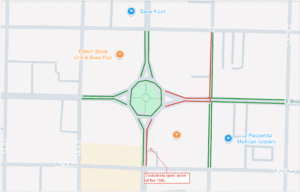As the summer season begins, the Knox County Health Department has begun its annual mosquito trapping season, testing for West Nile virus (WNV) in the community. We are seeing rain, cooler weather, and hot weather, sometimes all on the same day right now. That’s why the Health Department is asking for the public’s assistance to help reduce the risk of the serious diseases’ mosquitoes can carry. Each summer, the health department traps for mosquitoes around Knox County to determine the prevalence of WNV in the county. Trapping happens now through October 15th.
The mosquito traps will be monitored for West Nile Virus and other mosquito-borne illnesses. If you come across a black box with a white net, then you have come across the mosquito traps used for West Nile Virus testing. Please do not disturb them.
West Nile Virus is spread to people and horses through the bite of an infected mosquito. Mosquitoes first become exposed to the virus when they feed on birds that are infected with WNV. Once the mosquito is infected, it may transmit the virus to people or other animals when it bites them. Many birds can be infected with WNV, but crows and blue jays are most likely to die from the infection. Horses, too, are prone to severe WNV infection.
The most important way to prevent West Nile virus is to reduce the number of mosquitoes where people live, work, and play. Health Department staff strongly encourage everyone to remain vigilant about protecting themselves from mosquito bites and preventing mosquito breeding on their personal property. Mosquitoes breed in standing water, needing as little as one teaspoon. By draining all sources of standing water in and around your property, you can reduce the number of places mosquitoes can lay their eggs.
Eliminating places where mosquitoes can breed and reducing the chances of mosquito bites are the most effective lines of defense against exposure to West Nile virus. Precautions include the three “R’s” – reduce, repel, and report.
- REDUCE exposure – avoid being outdoors when mosquitoes are most active, especially between dusk and dawn.
- Make sure doors and windows have tight-fitting screens. Repair or replace screens that have tears or other openings. Try to keep doors and windows shut, especially at night.
- Avoid places and times when mosquitoes bite, before and after sunset and again just before dawn.
- Wear long sleeves and pants when in wooded areas. Keep pant legs tucked into boots or socks.
- Eliminate all sources of standing water where mosquitoes can breed, including water in bird baths, ponds, flowerpots, wading pools, pet’s water bowls, old tires, and any other receptacles.
- REPEL – when outdoors, wear shoes and socks, long pants, and a long-sleeved shirt, and apply insect repellent that contains DEET, picaridin, oil of lemon eucalyptus or IR 3535, according to label instructions. Consult a physician before using repellents on infants.
- REPORT – report locations where you see stagnant water for more than a week such as roadside ditches, flooded yards, and similar locations that may produce mosquitoes. The Health Department may be able to add larvicide to the water, which may kill any mosquito eggs.
For more information regarding West Nile Virus, please call the Knox County Health Department at 309-344-2224 or visit our website at www.knoxcountyhealth.org.
***Courtesy of the Knox Community Health Center***








